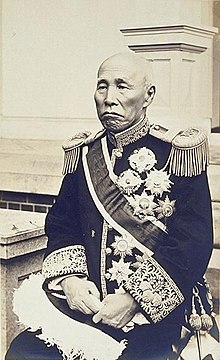Shigenobu Ōkuma
| Ōkuma Shigenobu | |
|---|---|
| 大隈 重信 | |
 |
|
| 5th Prime Minister of Japan | |
|
In office 16 April 1914 – 9 October 1916 |
|
| Monarch | Taishō |
| Preceded by | Yamamoto Gonnohyōe |
| Succeeded by | Terauchi Masatake |
|
In office 30 June 1898 – 8 November 1898 |
|
| Monarch | Meiji |
| Preceded by | Itō Hirobumi |
| Succeeded by | Yamagata Aritomo |
| Personal details | |
| Born |
11 March 1838 Saga, Japan |
| Died | 10 January 1922 (aged 83) Tokyo, Japan |
| Political party |
Rikken Kaishintō (1882–1896) Shimpotō (1896–1898) Kensei Hontō (1898–1908) Independent (1908–1914) Rikken Dōshikai (1914–1922) |
| Spouse(s) | Ōkuma Ayako |
| Signature |  |
Marquess Ōkuma Shigenobu (大隈 重信?, March 11, 1838 – January 10, 1922) was a Japanese politician in the Empire of Japan and the 8th (June 30, 1898 – November 8, 1898) and 17th (April 16, 1914 – October 9, 1916) Prime Minister of Japan. Ōkuma was also an early advocate of Western science and culture in Japan, and founder of Waseda University.
Ōkuma was born Hachitarō, the first son of an artillery officer, in Saga, Hizen Province (modern day Saga Prefecture) in 1838. During his early years, his education consisted mainly of the study of Confucian literature and derivative works such as Hagakure. However, he left school in 1853 to move to a Dutch studies institution.
The Dutch school was merged with the provincial school in 1861, and Ōkuma took up a lecturing position there shortly afterward. Ōkuma sympathized with the sonnō jōi movement, which aimed at expelling the Europeans who had started to arrive in Japan. However, he also advocated mediation between the rebels in Chōshū and the Tokugawa shogunate in Edo.
During a trip to Nagasaki, Ōkuma met a Dutch missionary named Guido Verbeck, who taught him the English language and provided him with copies of the New Testament and the American Declaration of Independence. These works are often said to have affected his political thinking profoundly, and encouraged him to support efforts to abolish the existing feudal system and work toward the establishment of a constitutional government.
...
Wikipedia
